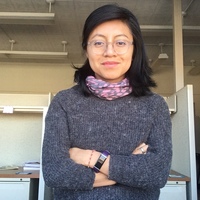Ana D Alonso Ortiz
Universidad Autonoma de Queretaro, Facultad de Filosofía, Faculty Member
- Ana D. Alonso Ortiz received a BA in Anthropology from the Universidad Autónoma ‘Benito Juárez’ de Oaxaca. She received her Ph.D. in Hispanic Linguistics from the University of Massachusetts, Amherst. As a speaker and member of a Zapotec community, her work focuses on the linguistic description o... moreAna D. Alonso Ortiz received a BA in Anthropology from the Universidad Autónoma ‘Benito Juárez’ de Oaxaca. She received her Ph.D. in Hispanic Linguistics from the University of Massachusetts, Amherst. As a speaker and member of a Zapotec community, her work focuses on the linguistic description of the Zapotec language and in the bilingual child acquisition of Zapotec and Spanish in Oaxaca, Mexico. As an anthropologist, her work includes the relationship between language and culture across Zapotec borders. She also collaborates with the Dill Yel Nban Collective, a group of Zapotecs who promote the Zapotec language and culture.edit
In this essay I share my fieldwork experience as a Zapotec researcher trained in anthropological and linguistic methodologies. I suggest that fieldwork is experienced differently by colleagues of non-Indigenous origin based on ethical,... more
In this essay I share my fieldwork experience as a Zapotec researcher trained in anthropological and linguistic methodologies. I suggest that fieldwork is experienced differently by colleagues of non-Indigenous origin based on ethical, political and internal relationships that cross my academic projects and my personal life.
Research Interests:
Resumen En este ensayo comparto mi experiencia de trabajo de campo como investigadora zapoteca formada dentro de marcos y metodologías de la investigación antropoló-gica y lingüística; sugiero que se experimenta de manera distinta a como... more
Resumen En este ensayo comparto mi experiencia de trabajo de campo como investigadora zapoteca formada dentro de marcos y metodologías de la investigación antropoló-gica y lingüística; sugiero que se experimenta de manera distinta a como lo hacen los colegas de origen no indígena. Expongo el entramado de relaciones éticas, polí-ticas y de polarización interna que atraviesan mis proyectos académicos y mi vida personal. Palabras clave: Trabajo de campo, Yalálag, investigadores zapotecos, diálogos, emo-ciones. Abstract In this essay I share my fieldwork experience as a Zapotec researcher trained in anthropological and linguistic methodologies. I suggest fieldwork is experienced differently by colleagues of non-indigenous origin based on ethical, political and internal relationships that cross my academic projects and my personal life.
Research Interests:
En este trabajo se describen las propiedades de los verbos posicionales en el zapoteco de Yalálag y una propuesta de análisis de su sistema. De manera especial, se examinan sus propiedades semán-ticas y las de las entidades que... more
En este trabajo se describen las propiedades de los verbos posicionales en el zapoteco de Yalálag y una propuesta de análisis de su sistema. De manera especial, se examinan sus propiedades semán-ticas y las de las entidades que categorizan, tales como animacidad, forma, tamaño, disposición y número gramatical.
This paper describes properties of positional verbs and offers an analysis of its system in Yalálag Zapotec. Specially, it examines its semantic properties and the ones of the entities these verbs categorize, such as animacity, shape, volume, disposition and grammatical number
This paper describes properties of positional verbs and offers an analysis of its system in Yalálag Zapotec. Specially, it examines its semantic properties and the ones of the entities these verbs categorize, such as animacity, shape, volume, disposition and grammatical number
